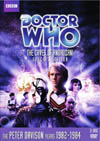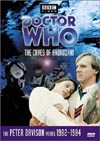"Special Edition" DVD Extras (on 2 discs, no less) include:
First ImpressionsAround the time of Androzani's first debut here on TVOntario in early 1987, I looked back at what the season had delivered so far, and thought that the show, and Peter Davison's Doctor, were getting really, really good, and improving nearly all the time.However, "The Caves of Androzani" turned out to be a slow and uninteresting interlude in his current excellent streak. I didn't see or find any reason to anticipate important characters in this one, or any events taking place that were important to the Whoniverse. Ah well, we'll just sit tight during this story, and hopefully get a better Peter Davison story after it, I thought...... The name "Robert Holmes" seemed vaguely familiar. Though I definitely had no memory of his writing credit on the first story I ever saw, "The Ribos Operation" (story no. 98), which at the time was the only story of his that I had seen, I dug through my collection of novelizations and confirmed that he had written "The Ark in Space" (story no. 76), which I hadn't been particularly impressed with in book form as it seemed slow and unnecessarily morbid. "Androzani" didn't seem to be much improvement.
Fresh AssessmentOn the plus side, you have to hand it to director Graeme Harper and his cast and crew for doing good hard work and making something that is often tense, often exciting and often atmospheric out of basically a misfocused script with a rubbish storyline for the Doctor. But in the end, the collection of bloodthirsty, self-centered characters that take over this story aren't really worthy of their inflated screen time, painting an excess of violence and action cliché to keep the audience mindless and glued to their seats. Philosophically speaking, there is almost nothing here to impress.But, buried deep in this cesspool, there is a hidden gem of an idea. Holmes seems to understand corruption like the back of his hand, particularly how it operates at the highest level. He does create a structure for the relationships his guest characters have with each other that nicely details the way in which the truly corrupt often plan to profit from conflict, secretly supporting both sides as necessary to further their interests. Davros gave us a few manoeuvres of this type in "Genesis of the Daleks" (story no. 78), but the situation here is interesting because it has been set-up to last over a much longer term. But "The Caves of Androzani" still does not capitalize on this idea well. The storyline should let the Doctor be the Doctor, who would naturally investigate, expose, comment on, and put an end to this scheme, thus drawing viewer attention to the most interesting aspect of the narrative. That could have drawn proper attention to the dynamics, perhaps helped the audience wake-up to this pattern that commonly threatens our sociological structures today, and actually have done society some good in bringing this story to the screen. Instead Holmes wastes too much time playing prisoner with the Doctor and giving us the dramatic inertia of simply demonstrating who his characters are, until he only has time to wipe them all out with a typical 1980's bloodbath. Holmes seems to have fallen into a similar trap with his season four Blake's 7 script "Traitor". Nowhere to be seen are there any locals that the Doctor and Peri can claim to have truly helped by their visit either.
The Lack of the Best of Peter Davison's DoctorWith such a whacking great flaw in how the storyline fails to utilize the Doctor properly, you have to wonder what is going on in the mind of anyone when they think Peter Davison only finally got his character right in this story. I look at this, and I can't find his character here at all. At least, not the character I tuned in to see. Granted, his first conversation with General Chellak gave me a flashback to all the scenes Jon Pertwee had clashing ineffectively with officials, stuffy people, and anyone else he considered too slow. Emphasis on "ineffective", because it wasn't much good back in those days either. Indeed, watching Davison get slapped around each time he cheerily utters some flippant remark is not my idea of how to make this character work.Perhaps people latch onto the line "Curiosity has always been my downfall," thinking that, yes, that really sums up the Doctor. Or the fifth Doctor. What a load of crap. Curiosity and heroism are the two traits the Doctor has that consistently drive good science fiction story beats. Downfall? Try excellence. Part of the reason why this story stinks is that the Doctor's curiosity dries up long before it has exposed the corrupt conspiracy properly for the viewer, and because the Doctor's heroism does not effectively extend further than his current companion's welfare. It's also important to note how often the Doctor passes up excellent opportunities to do much, much better in this story. Even if the excess of the prisoner dynamic is less than ideal for episodes one and two, you can still put up with it to some degree at this stage, because it looks as though the Doctor is gathering a lot of information on these characters and their situation for later use. Episode two though gives him plenty of opportunity, while in Jek's hideout, to start messing with some of those consoles and reprogram his whole army of androids. That would have been the Doctorish thing to do. Yes, the androids might be ready to defend those consoles against unauthorized access, but Holmes already gave the Doctor a less-than-believable immunity to that anyway. Instead, we settle for a last minute escape. Do the Doctor and Peri get some credit for rescuing Major Salateen? Normally they might, and this certainly does trigger a bit of a chain reaction amongst the shenanigans of the guest characters. But does it really ever do anyone any good in the long run? Sadly no, not really. And his rescue is such a side effect of their desire to save their own necks and run off in the TARDIS, it never really demonstrates any great achievement on their part. When it all boils down, there is so much random misinterpretation and "deus ex machina" at work dragging the guest cast into the bloodbath that cops out of resolving the story properly, the rescue of Salateen really doesn't count for much. As a storyline, "Androzani" really loses it at the start of episode three. The Doctor has spent all his time so far in the prisoner dynamic, but has just escaped and is free to start taking action in this adventure. And what does he do? He walks up and surrenders to the exact same band of lunatics he has just escaped from, for no apparent good reason. WHAT... THE... HELL???? Could Holmes really not think of anything better to give him to do? Nothing springs from this move other than another waste of all the Doctor's screen time for another episode and a half, and he doesn't learn anything new in this later bout of the prisoner dynamic that is worth such an expenditure. Peter Davison is also keen to say in interviews and on commentaries that he thinks this story finally got a good sense of pace from the director Graeme Harper. As far as I was concerned, the script wasn't moving at any great pace at all. From the moment we first see Morgus' office on the companion planet Androzani Major, this was a set I fully expected to see the Doctor, and probably Peri as well, walk into and ideally take control of. Finally, during episode three, the Doctor seemed to be on his way, but the journey was being dragged out with the most boring of interim scenes and conversations that really went nowhere. And then without getting there, they turn around and go back to Androzani Minor. What a royal waste of time! Why even bother setting out on the journey in the first place?! The whole exercise gave us nothing of value and simply wasted more screen time. And in the final episode, what do we get? The Doctor just runs around, with there being no really good reason why all the bullets fired at him all miraculously miss, while none of the guest characters are as lucky. Then he goes off on a very solitary side quest, still not interacting proactively with the guest characters' situation, while they wipe themselves off the slate all by themselves. So, so far from ideal..... Ultimately, my biggest reason for not counting this as a great Doctor Who story is because it isn't really a Doctor Who story at all. It's a story about some other people and the Doctor just happens to float through it with minimal impact. Of course, the real debate is not whether or not these things could plausibly happen to the fifth Doctor and Peri. The debate is really about whether or not it's worthwhile to put cameras on long pace-less sections of such incidents and try to make four episodes out of it, or to spend more time showing the times when he actually moved around freely investigating and solving problems. In the case of "The Awakening" (story no. 132), it was decided that cameras would NOT hang around for four episodes; they would instead only hang around for two. Ultimately, you will have to look elsewhere to see Peter Davison at his best as the Doctor, and in terms of really nailing all the best qualities of the character in one story, I think we will truly find Davison at his best in "Frontios" (story no. 133). It is there that I find his positive philosophies and actions at their most satisfying levels.
The Un-Sci-Fi DramaThere's really not much in this tale to stamp it as sci-fi either. Yes, it's an alien planet, with mudbursts instead of volcanic activity, and that's all good. The series is about to be stuck in a succession of desert planets though, with all the quarries used to realize this having little chance of outdoing the excellent Lanzarote footage from the last story: "Planet of Fire". Still, they have a valiant go at producing some good vistas here. Really, I find this story's setting VERY reminiscent of Holmes previous Doctor Who script, "The Power of Kroll" (story no. 102), with a futuristic Earth colony on a big major planet exploiting the resources of a companion minor planet. Just substitute mud-desert for marshy-swamp, and bat-produced spectrox for sea-life-produced protein. Even if the guest characters of "Kroll" aren't drawn quite as satisfyingly as here in "Androzani", the plot was far better, allowing the Doctor to get a good grip on events and become a more integral part of them, plus it all linked into the Key to Time arc and held up as being a more important event in the Whoniverse. And it was so easy to root for the refinery crew when they were faced with the unknown of Kroll stirring up beneath the swamp, and when they were investigating it as phenomena should be investigated in science fiction. Even without "Kroll" being one of Robert Holmes' really great stories, I have to say I think it was miles better than what he wrought here.Pretty much the only real sci-fi concept explored in this story is that of the life-prolonging spectrox extract, which only remains a minor piece of background. A true exploration of life-prolonging phenomenon should include mental disciplines, emotions, habits, and behaviours, and not all be put down to some substance to be ingested. So that subject isn't really tackled to great extent. Really, spectrox is just there as a substitute for oil, diamonds, opium, (Kroll protein), and any other commodity that gave the highest powers an excuse to set up profitable conflicts in the unique areas in which they were found. Perhaps most obvious for something that wants to function as a sci-fi action story, why are we witnessing futuristic humans who have colonized other worlds using bullets and today's submachine guns? Where are the lasers? It's so un-sci-fi, it can't hope to qualify as delivering the action I would want to see from the show. This appears to have been a deliberate Graeme Harper choice, removing part of the series' draw for me, so it will eat into his marks as a director. Granted, if "Warriors of the Deep" (story no. 131) and "Resurrection of the Daleks" (story no. 134) are any indication, trying to do massive shootout action with superimposed beams seems to have been something that the show's post-production of that era would rarely find time to do properly, so he has a point there. But Graeme Harper's "Planet of the Ood" (story no. 196) will later suffer the same flaw without these post-production concerns, so in many ways it is a question of taste. At least Harper's "Revelation of the Daleks" (story no. 143) sports a mix of the two types of weapon effects. Peter Grimwade was better at insisting to push the envelope, and getting lots of good post-production effects for the time for "Earthshock" (story no. 122). If such things are deemed to consume far more time than will be available, the next best thing would be flash-charge pistols à la "The Monster of Peladon" (story no. 73). At least they still look futuristic and sci-fi.
Really, a character of Jek's type is typical for this role in the structure of the high-level corruption game that is being played out, along with his feelings of being wronged by someone against whom he desires vengeance. This is a known quantity and should be passed by quickly in favour of investigating the game itself and those at the highest level. This the story doesn't do very well. On some level, it almost appears like the entire guest cast, Jek included, is each caught up in their own variation of passive-aggressive syndrome, but not quite. Most of them are hardly passive at the beginning of the story; they are deadlocked against each other instead. But I think it looks enough like passive-aggressive syndrome, and is filled with enough mercenaries, to get Eric Saward to give it the green light, no editing attempted. Holmes always did seem to have the knack of pleasing his script editors and producers, and rolling with whatever the current direction of the program was.
Naive ExpectationsMy first inkling that a new regular line-up was on the way came as I boarded the school bus one day, to learn that one of my friends had bought me a Doctor Who book called "Make Your Own Adventure with Doctor Who: Crisis in Space" by Michael Holt. The characters on the cover were unknown to me, but inside it said: "Acknowledgements to Colin Baker as the Doctor, Nicola Bryant as Peri, and Mark Strickson as Turlough". It was an unpleasant shock. "Not that vicious moron from Arc of Infinity," I thought. I returned to the front cover and, to my horror, that was him, the former Commander Maxil. How could they ever have chosen him for the Doctor? Well, it's a role, and if he's a good actor, maybe he'll turn out okay, I consoled myself. At least Turlough was still part of the line-up I thought. I checked the book's copyright date: 1986. The episodes I was watching were made in 1983, so Peter Davison probably had some time. I was still assuming each Doctor had had a run of five years and that Peter would get the same.I had also somehow heard about a story called "The Five Doctors" (story no. 130) which still hadn't aired in TVOntario's run yet, and I knew that Peter Davison's Doctor, Turlough, and Tegan were meant to be the "current" line-up in it. I was still sure that Tegan would return at least temporarily, and felt that Turlough would return a little more permanently and stick around until after the Davison era ended. Peri's joining the series in the last story had seemed to have come a bit soon, but I wasn't too worried. Davison was only two and a half years into his run, and probably had a lot of good stories still coming up. Well, you can imagine how I felt when this best-forgotten adventure went on to end by killing any chance of better Davison stories to follow. More shock and awe. This story made me feel cheated out of another two and a half years of Peter Davison's Doctor. Not his greatest moment by any stretch of the imagination.
"I might regenerate...."To be fair, the regeneration sequence itself is well done, and is one of the landmark moments of the season and the series as a whole. As usual in the JNT era, we get flashbacks, which are done this time with completely new footage of previous cast members, and some excellent, very Who-ish, effects. It is, really, the best part of the story in retrospect. Colin Baker's cameo of a performance here is on the money and quite correct.Although we didn't know it until at least another week, this is probably also the moment that the Doctor burst out of the passive side of the arc that Saward was crafting for him, and onto the aggressive side. But that's an examination for another era.......
International Titles:Deutsch: "Die Höhlen von Androzani"Magyar: "Az androzani barlangjai"Français: (Les Grottes d'Androzani)Русский: "Пещеры Андрозани"
Season 21 Peter Davison Story Rankings:
This story has become available on DVD and VHS video.
Comments on this article are welcome. You may contact the author from this page:
|
|||||||||||||||||||||||||||||||||||||||||||||||||











